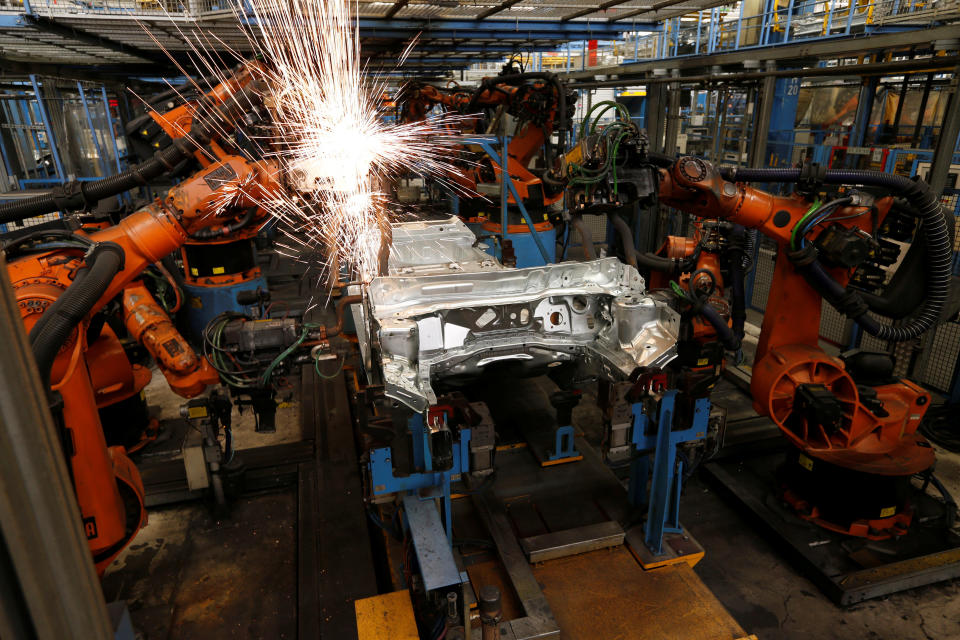Automation study: 1 robot takes 5.6 jobs per 1,000 workers

Treasury Secretary Steven Mnuchin raised eyebrows last week by saying he was “not worried at all,” about robots taking jobs, even going so far to say, “I’m optimistic.” According to Mnuchin, “it’s not even on our radar screen…50 to 100 more years.”
According to a new study by researchers at MIT and Boston University, this is very wrong, and the data tell a far different story of robots driving down wages and stealing jobs. The researchers, Daron Acemoglu of MIT and Pascual Restrepo of Boston University, examined the rise of industrial robots, which increased fourfold between 1990 to 2007 or around one robot per every thousand workers, largely in the automotive and electronics industries.
That one robot, the research found, reduces the aggregate employment-to-population ratio by 0.34 percentage points. Translated from professor-speak, the researchers say that’s equivalent to “one new robot reducing employment by 5.6 workers,” a figure that factors in workers being soaked up by other industries unaffected by industrial robots. And by making the labor market more competitive, one robot can depress wages by 0.25% to 0.5%.
At the same time, the researchers note that “perhaps surprisingly, we do not find positive and offsetting employment gains in any occupation or education groups.”
Mnuchin’s denial isn’t new, but ignores fundamental Wall Street maxim
There is vast historical precedence for Mnuchin’s optimism in the face of research like this, as economists like John Maynard Keynes worried about technological unemployment due to machines way back before World War II. But like any financial disclaimer says, past performance is no guarantee of future results.
A look around shows no telephone switchboard operators, elevator operators, assembly-line welders or video-rental stores. Now cars that drive themselves are on the road in some places.
Throughout the 2016 campaign, Trump uttered nary a word about automation, choosing instead to rail against exporting jobs to China and Mexico, but automation is becoming impossible to ignore. As domestic manufacturing has boomed, that sector’s employment has declined considerably. And to throw salt in the wound, the robots taking jobs are foreign-made, a recent Wall Street Journal report noted.
Future robots
Automation may be accelerating, but it hasn’t reached a critical threshold quite yet. According to Acemoglu and Restrepo, the number of jobs lost to robots has been between 360,000 and 670,000 from 1990 to 2007. “However,” they write, “if the spread of robots proceeds as expected by experts over the next two decades, the future aggregate implications of the spread of robots could be much more sizable.”
These predictions fall into two categories, one that extrapolates things out, expecting more job and wage losses. In the other situation, “the response of employment and wages may be different once the number of robots exceeds a critical threshold,” the researchers say. In other words, economists like Keynes still have a chance to be proved right.
Ethan Wolff-Mann is a writer at Yahoo Finance focusing on consumer issues, tech, and personal finance. Follow him on Twitter @ewolffmann. Got a tip? Send it to [email protected].
Read more:
Facebook’s copy of Snap stories is a reminder of a Silicon Valley hard truth
Jared Kushner’s ‘innovation’ office will get advice from Bill Gates, Tim Cook and Elon Musk
The trick to getting credit card fees waived? Just ask
These two companies lobby to make your taxes way harder
Chase’s Sapphire Reserve is very worth it, even with its slashed bonus
51% of all job tasks could be automated by today’s technology